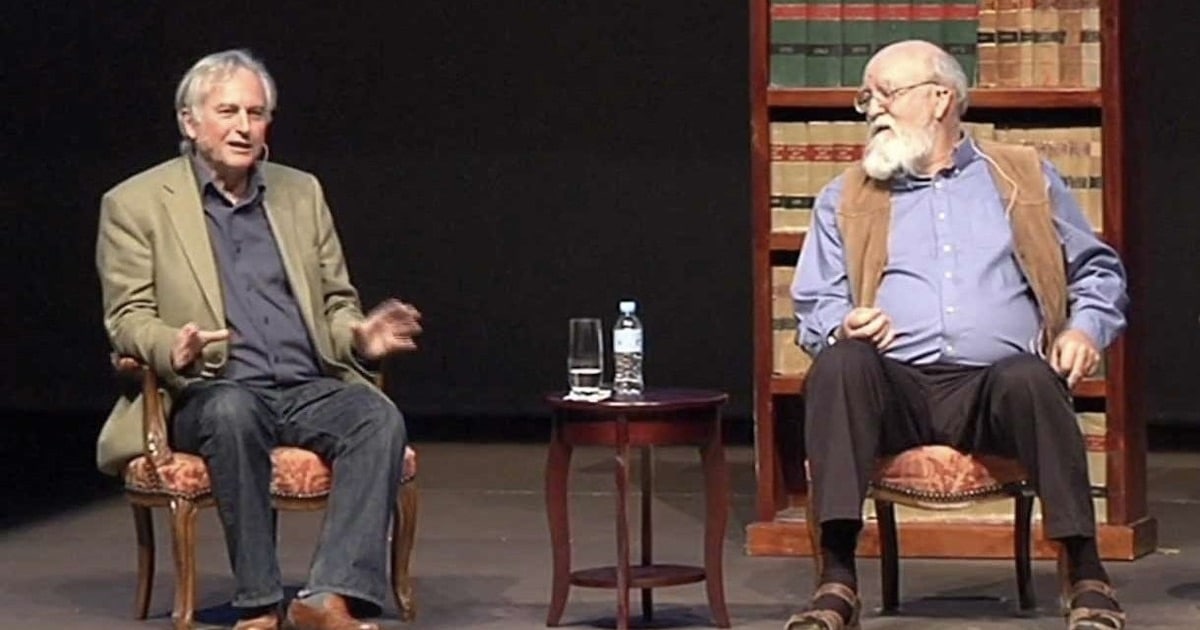 Evolution
Evolution
 Intelligent Design
Intelligent Design
Dawkins, Dennett, and the Taste for Iconoclasm

I’ve had two memorable encounters with Richard Dawkins and Daniel Dennett, one with Dennett alone, the other with both together. The first was with Dennett alone. In 1999, my good friend Paul Nelson and I were doing some tag-team talks on intelligent design in the Boston area at MIT and Tufts. The talk at Tufts, Dennett’s university, was in the evening, so we had some time beforehand. We therefore decided to attend Dennett’s philosophy of science seminar, which was taking place late that afternoon.
The Aquatic Ape
Dennett was hosting Elaine Morgan, an evolutionary anthropologist. In her talk, she described her “aquatic ape hypothesis.” According to this hypothesis, in the evolution of humans from hairy ape-like ancestors, we had an aquatic phase in which we lived primarily in water. Our water phase is supposed to account for a number of human characteristics, including our smooth skin.
Dennett didn’t accept Morgan’s aquatic ape hypothesis, but he did give her a forum. He saw it as helpful to his students and colleagues to engage her. And he himself has defended her view in his 1995 book Darwin’s Dangerous Idea:
Many of the counterarguments seem awfully thin and ad hoc. During the last few years when I have found myself in the company of distinguished biologists, evolutionary theorists, paleo-anthropologists, and other experts, I have often asked them just to tell me, please, exactly why Morgan must be wrong about the aquatic ape theory. I haven’t yet had a reply worth mentioning, aside from those who admit, with a twinkle in their eyes, that they have often wondered the same thing
In her talk at Tufts, Morgan was affable, and she made a detailed case for her position. She also made available for sale at the talk her then recently published book The Aquatic Ape Hypothesis, which I bought and had her sign (it remains somewhere in storage).
Near the start of the seminar, Dennett noted that Paul and I were in the audience and would be speaking at Tufts that evening on intelligent design. He then remarked: “If your taste for iconoclasm exceeds even mine, attend their talk tonight.” It was an amusing shout-out. Dennett clearly regarded Elaine Morgan as an iconoclast. Yet to his mind, her iconoclasm was far less than Paul’s and mine in advancing intelligent design.
To my mind, Morgan is the bigger iconoclast, and intelligent design is sound sober theorizing about biological origins and complexity. Yet as Dennett could rightly note in reply, the taste for iconoclasm is a matter of taste. For whatever reason, Dennett didn’t attend our talk that night.
“The Deniable Darwin”
My second story involves both Richard Dawkins and Daniel Dennett, and occurred in 2003. I was editing for ISI Books an anthology titled Uncommon Dissent: Intellectuals Who Find Darwinism Unconvincing. I wanted to include not just David Berlinski’s article “The Deniable Darwin” that had appeared in Commentary in June 1996 but also the some of the letters that had been written in response to the article in the September 1996 issue. (The links here give you everything that appeared in Commentary!)
David’s piece was 10 double-columned pages. The responses took up 30 double-columned pages. The responses ranged from pro-ID people who were favorable to David’s piece (notably Phillip Johnson and Michael Behe) to a who’s who of Darwinists opposed (notably Richard Dawkins and Daniel Dennett). There was also a closing response to all the letters from Berlinski himself.
The anthology I was editing didn’t have room for all the letters, but I wanted a representative sampling of letters by the Darwinists. In particular, I wanted to reprint the letters by Dawkins and Dennett. So I contacted them to ask permission. Note that Commentary would have been happy to grant permission, but the copyright for the letters belonged to the letter writers.
Both Dawkins and Dennett refused to grant permission to reprint their letters. I asked them to reconsider, but they refused again. Finally, I decided that the anthology would be richer if, even without their actual letters, the substance of what was in those letters were reprinted. I therefore paraphrased the letters and sent my paraphrase to Dawkins and Dennett to ask whether they thought I had represented their original letters accurately.
Instantly both got back and gave me permission to reprint their letters, preferring their words to mine. There’s no doubt a lesson here: we prefer our own words to those of others who would speak for us.
Cross-posted at Bill Dembski on Substack.
